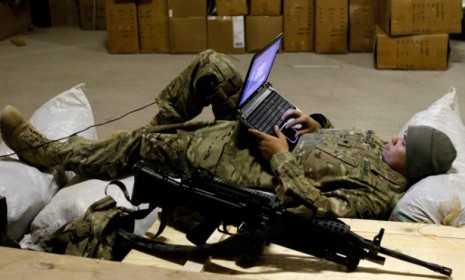Are terrorists posing as hot girls on Facebook to spy on soldiers?
According to the Pentagon and Australia's defense department, our troops are a sucker for sexy Facebook "friends" who are more deadly, and less attractive, than they seem

A free daily email with the biggest news stories of the day – and the best features from TheWeek.com
You are now subscribed
Your newsletter sign-up was successful
"Taliban insurgent" and "savvy Facebook spy" are not phrases you expect to see linked, but an Australian military report pairs them up — with life-and-death implications not just for Aussie troops in Afghanistan but for U.S. forces around the world. The Australian report, drawing heavily from U.S. Defense Department material, offers lots of tips and rules for security-minded social networking, says Erin Gloria Ryan at Jezebel, including a head-smacking alert about "Taliban members running fake sexy lady Facebook pages, befriending soldiers, and spying on the soldiers using the social networking site's location-tagging technology." Are NATO soldiers really that foolish, or Taliban insurgents that tech savvy? Here's a look at the Facebook honey-trap, and other social media ruses:
What's the goal of the Australian report?
Titled "Review of Social Media and Defense," the 200+ page document [PDF] examines the benefits, possibilities, and dangers of Facebook and other social media services vis-a-vis the military. "Many individuals who use social media are extremely trusting," both of people seeking to befriend them online and the shifting privacy settings of the services they use, it says. And yes, the report notes, "the Taliban have used pictures of attractive women to front their Facebook profiles and have befriended soldiers."
The Week
Escape your echo chamber. Get the facts behind the news, plus analysis from multiple perspectives.

Sign up for The Week's Free Newsletters
From our morning news briefing to a weekly Good News Newsletter, get the best of The Week delivered directly to your inbox.
From our morning news briefing to a weekly Good News Newsletter, get the best of The Week delivered directly to your inbox.
Are soliders really that gullible?
Perhaps naive is a better word. People "did not recognize that people using fake profiles... could capture information and movements," the report says. One of the most intriguing sections is a case study of a fictional "young, attractive female" named Robin Sage, created for the Pentagon by contractor Thomas Ryan, says Daniel Stuckey at Motherboard. Male soldiers offered Sage jobs and tickets to conferences, and let "her" see their discussion of operational security details like "locations and what time helicopters were taking off." In other words, "too-trusting troops may be leaving themselves vulnerable to attacks," says Jezebel's Ryan, "because big strong men still can't resist a friend request from a hot chick."
Other than posing as women, what other social-media ruses do our enemies use?
Spies and insurgents can also pretend to be high school friends of either gender, or create spoofed Facebook pages which soldiers are induced to "like." And "even savvy netizens can get duped," like U.S. Adm. James Stavridis, "an avid Facebook and Twitter user" who's also NATO Supreme Allied Commander Europe (SACEUR), says David Axe at Wired. Some of Stavridis' pals linked up with fake Facebook accounts set up in his name by, among other agents, Chinese spies. But letting disguised enemy "friends" read your Facebook feed is only one of the pitfalls. Two other major ways soldiers are left vulnerable: Geotagging, or the embedding of GPS data in photographs, and automatic location logging when you use services like Facebook or Foursquare. The Army learned this lesson the hard way in 2007, when soldiers in Iraq uploaded inadvertently geotagged photos of Apache helicopters. "The enemy was able to determine the exact location of the helicopters inside the compound and conduct a mortar attack, destroying four of the AH-64 Apaches," the Army acknowledged in 2012.
A free daily email with the biggest news stories of the day – and the best features from TheWeek.com
What are the key lessons for the military, and the rest of us?
First, the military can't ignore social media, says Geoffrey Ingersoll at Business Insider. In Afghanistan, new expansion of infrastructure like WiFi and cellphone towers "has provided a new dimension for the Taliban to conduct warfare," and NATO is playing catch-up: Telling "troops to just stay off social media" won't cut it. Absolutely, "a grasp of social media is a must in today's military," says Motherboard's Stuckey. But some of the military's "proverbs for safe social networking" are essential for civilians, too. Like: "Assume the enemy is reading what you're writing," and nothing you tweet or post will ever really disappear. Finally, no matter how hot she (or he) is, "A friend request from an unknown babe might be tempting, but it might also be the biggest threat to homeland security we know."
Sources: Australian Department of Defense [pdf], Business Insider, Jezebel, Motherboard, Wired
-
 Samurai: a ‘blockbuster’ display of Japanese heritage
Samurai: a ‘blockbuster’ display of Japanese heritageThe Week Recommends British Museum show offers a ‘scintillating journey’ through ‘a world of gore, power and artistic beauty’
-
 BMW iX3: a ‘revolution’ for the German car brand
BMW iX3: a ‘revolution’ for the German car brandThe Week Recommends The electric SUV promises a ‘great balance between ride comfort and driving fun’
-
 Munich Security Conference: a showdown between Europe and Trump?
Munich Security Conference: a showdown between Europe and Trump?Today’s Big Question Report suggests European leaders believe they can no longer rely on the US for military support – but decoupling is easier said than done